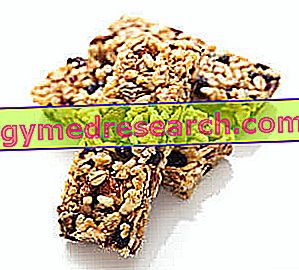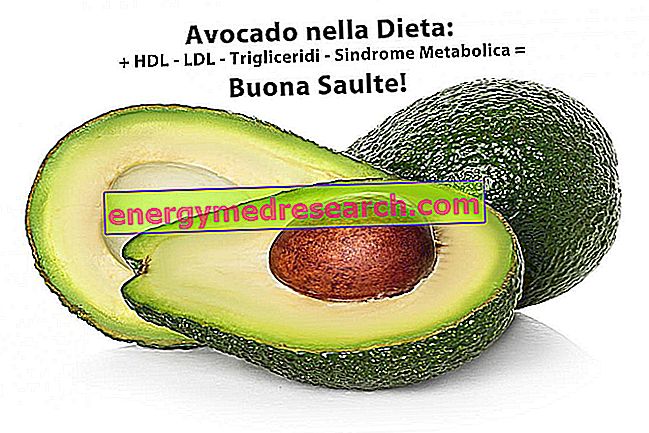Introduction
"Snack" means any food (or food product) intended for consumption in SECONDARY meals, therefore as a snack; the adjective diet, depending on the contexts, can instead indicate two different types of food:
- diet foods proper (regulated by law);
- foods and food products that are commonly referred to as "dietary" simply because they are low in calories .
As anticipated, the first group, that of dietetic foods proper, is subject to legislative regulation * and includes ONLY:
products whose common characteristic is that they have been designed and formulated to meet the specific nutritional needs of individuals with disturbances of the intestinal absorption process, with metabolism disorders or in any case in particular physiological conditions .

As can be deduced, many of the snacks of the first group can also be enclosed in the second set but, fortunately, not the opposite. In fact, there are many low-calorie and light foods that are neither processed nor handled, to the benefit of the consumer's taste and wallet.
On the other hand, even the word "diet" is not always synonymous with "low calorie"; in fact, certain very energetic products such as gluten-free bread, diabetic pasta, lactose-free milk, omega-3-enriched milk, light margarine, vitaminized oils, etc. can also fall into this category; these last two, in particular, are not absolutely low-calorie (on the contrary!) but they are still diet foods because they are useful for the treatment of certain pathologies
Low-calorie snacks belonging to the Dietetic Food group proper
The low-calorie snacks belonging to the group of "diet foods" are all those that highlight their low intake of calories, the high fiber content or the high concentration of high biological value proteins and / or vitamins and / or mineral salts etc. These are mainly substitute meals (bars, smoothies, etc.) and cereals rich in fiber for breakfast.
To be sure, it is not certain that these foods are "objectively" not very energetic; rather, the relative "recommended portion" is. So to speak: 100g of vitaminised bran sticks contain about 260kcal, as well as 100g of replacement meal in bars bring from 350 to 400kcal. However, the recommended ration of cereals is only 5-7 tablespoons at a time and that of bars corresponds roughly to one or two pieces. The high energy density of these products is caused by the lack of water inside them and, as with all other foods, this requires limited consumption portions.
It should also be specified that NOT all dietetic snacks belonging to the group of "diet foods" are based on cereals or dehydrated flours. For example, replacement meals in brik, as well as enriched yoghurts, have a higher concentration of water, therefore higher consumption portions; On average, caloric intake is about 4 times lower than dry cereal-based snack foods.
Dietary Snacks belonging to the Low-calorie Food Group
We now come to the description of the dietary snacks belonging to the group of low-calorie and light foods. These are all those products that provide little energy - usually around 100kcal per 100g - and that do not NECESSARILY undergo processing to achieve specific dietary properties.
While excluding dietary foods proper, these are foods that belong to as many as 6 of the 7 basic food groups (cereals and seasoning fats are excluded); some quite indicative examples are: cooked egg whites, natural yoghurt, some fruits, all vegetables, cooked vegetables, boiled potatoes etc.
These products are raw or processed in an essential manner (cooking or fermentation) and, compared to the average of the foods, they provide less energy. Cereals have been excluded because, even when cooked, they have a lower percentage of water with an energy intake greater than 100-120kcal per 100g of edible portion. Obviously, seasoning fats and dried fruit (oil seeds) are even more caloric due to the massive presence of triglycerides within them.
In General: Chemistry and Function of Dietary Snacks
In addition to the caloric aspect, diet snacks should have other very important characteristics. These are: satiating capacity (provided above all by the fiber, water and the volume of the portion), low glycemic index (the boiled potato is an exception), low glycemic load (estimated on 100g) and good digestibility (tolerance to legumes is subjective ).
Secondly, dietetic snacks perform different functions based on the chemical nature of the molecules that compose them. Some are basically energetic, such as: potato, certain fruits, vegetables and legumes; others play the role of plastic support very well, such as yoghurts, cooked egg white, light milk flakes, natural tuna, etc. Some, in addition to the plastic function, are also able to support diets aimed at improving intestinal motility (wholegrain products, vegetables, legumes and fruit) or the trophism of the physiological bacterial flora (yogurt, Greek yogurt, kefir etc.).
We remind you that "formulated" diet snacks such as substitute meals (bars, shake or milkshake powders, ready-to-eat foods, etc.) may show a variable composition depending on the type and production company.
It goes without saying that the choice of one or the other product (although not having to be NEVER monothematic) must take into account above all some variables such as: the overall diet, nutritional needs and possible symptoms or disorders of the subject. Those who suffer from constipation will prefer fruits, vegetables, whole grains or legumes; sportsmen who require a prompt replenishment of glycogen stores after exertion will take advantage of the nutritional properties of the boiled potato. Finally, those who need an adequate plastic support will find an excellent solution in products such as: egg white, canned tuna, lean milk flakes, thickened low-fat yogurt, etc. Obviously, those who do not have special needs will be guided (in the event that the possibility of buying / transporting higher quality food) is missing on pre formulated replacement meals.



